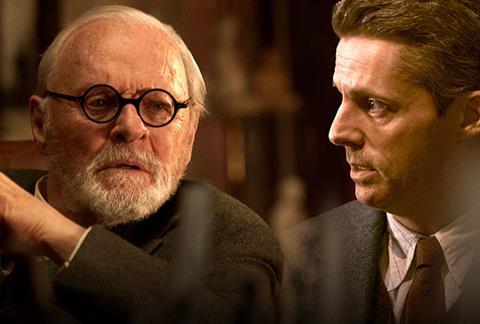On the eve of the second world war, Sigmund Freud invites a young Oxford professor to his house to debate the existence of God. Not long afterwards he dies of suicide. What did the pair talk about, and was Freud’s mind ever changed on the question of faith?

Freud’s Last Session imagines a conversation between the psychologist, Sigmund Freud – at the end of his life – and the writer and academic, CS Lewis – before he achieved the literary fame he would later be known for.
“Jack” Lewis, introduced by Freud as a Christian apologist – “He’s got a lot to apologise for” – is invited to Freud’s house to discuss his fervent belief in the existence of God. But the father of psychoanalysis is not interested in a mere debate about the historical existence of Jesus, or the likelihood of a creator. He wants to know why Lewis believes what he does.
“What my patients tell me is never as interesting as what they don’t tell me” Freud says, and so, over the course of the one hour 48 minutes running time, Freud digs into Lewis’ emotionally chilly childhood and his traumatic experiences in the trenches of the first world war.
But Lewis is not content to have only his life under the microscope – he turns the spotlight on Freud, whose own familial relationships are illuminating.
Did Freud and Lewis ever actually meet?
In the film’s end credits, we are told that in his last days, Sigmund Freud was visited by an unnamed Oxford don, which this film imagines to be CS Lewis. Freud’s Last Session therefore exists within a really small sub-genre of films that appeal to history nerds like myself. Films such as Frost/Nixon, The Two Popes (which also starred Hopkins) or even to some extent, Netflix’s The Crown. They are all examples of speculative fiction imagining private conversations between great figures in history. This might annoy the purists, but fascinate those with only a passing knowledge of the subject matter, who are often inspired to learn more.
While this film is definitely intriguing, it doesn’t quite work as a piece of cinema. The premise of the film is remarkably simple, but the topics are so wide ranging, so seemingly obtuse for a 21st century audience, that it’s really difficult to follow.
On the one hand, the film should be applauded for not dumbing down the debate between two great thinkers, but on the other, it can feel a little alienating for anyone not well-versed in either Freud or Lewis’ work.
Freud’s shortcomings as a father, and the nature of Lewis’ relationship with a friend’s mother, are never fully explored. Freud’s Last Session is simultaneously too much and not enough. You can tell almost straight away that it was based on a stage play, which in turn was inspired by a book. While the cinematography in the film is absolutely beautiful, ultimately, it feels like the director, Matthew Brown, is trying to make up for something.
Where does CS Lewis’ need for God come from?
Whether you believe in God or not, Freud’s Last Session is unlikely to change your position on the subject. In its purest sense it is a well-meaning discussion, but there are no knockout rhetorical blows.
When questioning Lewis’ faith in God, Freud asks him whether his distant relationship with his father made him seek out a closer relationship with God the Father. Lewis responds by asking Freud if his antagonistic relationship with his own father led him to reject the entire concept of a father figure, including a heavenly one.
As the field of psychoanalysis has moved on considerably since its foundation, many of Freud’s theories sound almost quaintly absurd when said out loud. His theories about homosexuality are undercut by his inability to accept his daughter’s same-sex relationship. Conversely, Lewis does a solid job of defending his faith, but when presented with the question of pain and suffering, he has no satisfying answers. Nevertheless, when Freud talks of the pain of losing his daughter and grandson, Lewis offers no pat explanations, he just listens – something we could all learn to do more of.






































1 Reader's comment